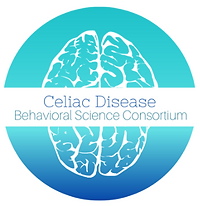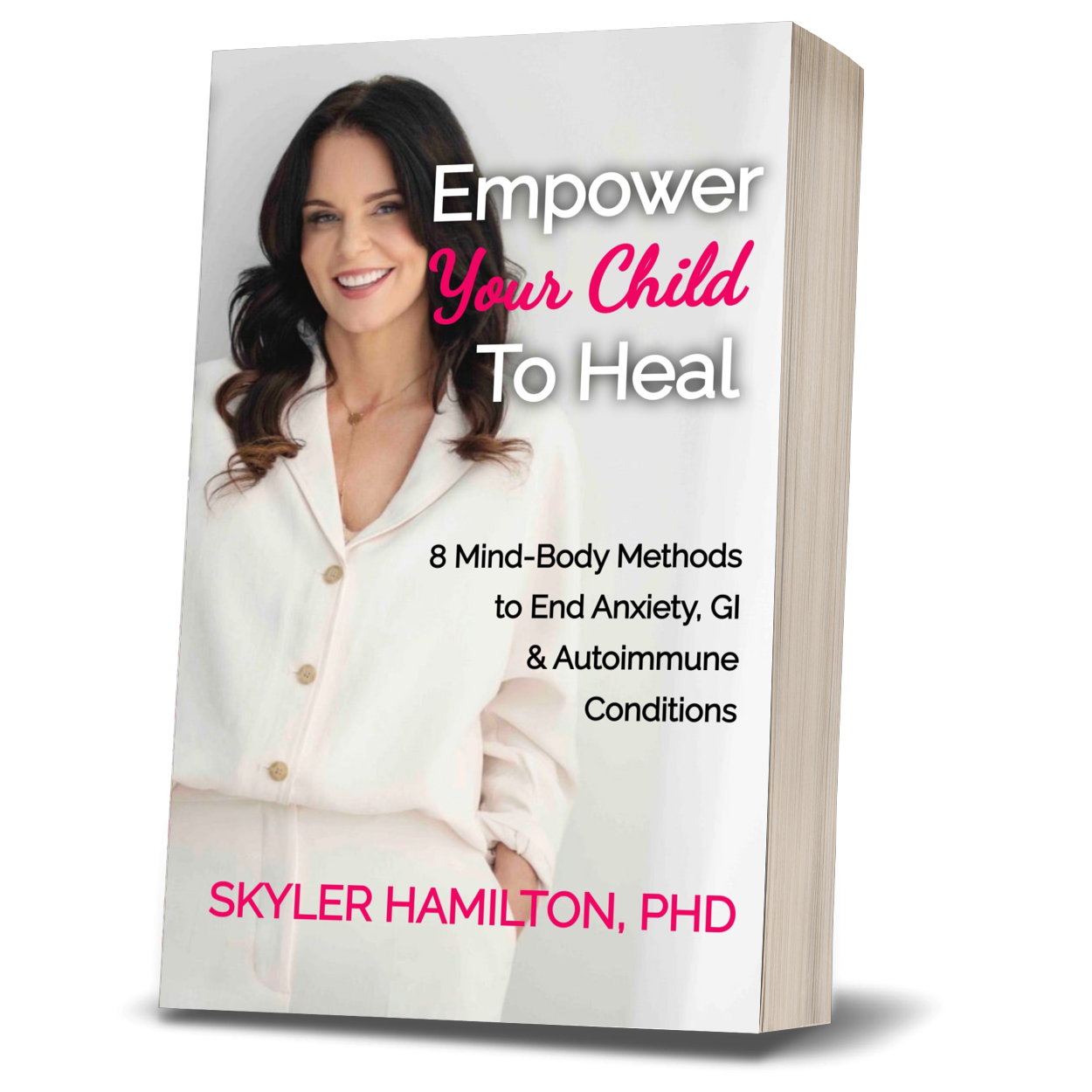Meet Dr. Skyler
Dear Parents:
We both know our children suffering from autoimmune or gastrointestinal disorders pay the price for no known medical cures. The emotional and financial burdens weigh heavy as they plod along looking for answers to seemingly mysterious conditions. However, my new book Empower Your Child To Heal reveals how tapping into the power of the mind can resolve many ailments without invasive or pharmaceutical interventions.
I know from personal experience.
Once diagnosed with multiple sclerosis, bound to a wheelchair and blind in one eye, I no longer suffer from any symptoms. How? Simple. The brain has the power to “think” and “believe” ourselves into illness or wellness. Now 30 years later, I have the benefit of hindsight, a fundamental understanding of neuroscience, a PhD, and experience working with hundreds of pediatric patients. There’s a message and a map to healing hidden under all the pain, symptoms, and the tears. More importantly, we all have tools to unlock and unblock this pain and allow the body to heal itself. The body is designed to heal, but not if the naturally-restorative processes are obstructed by neurobiological programming from an early age.
Based on my peer-reviewed research, work with hundreds of parents and pediatric patients, and my own experience raising a daughter with an AI condition, I’ll walk the reader through the science-backed strategies that can empower their child to heal.
To your health,
Dr. Skyler
Proud member and researcher for:
My Background
-
Skyler Hamilton Ph.D. specializes in helping people tap into the power of the mind to successfully treat inflammatory diseases, autoimmune and brain-gut disorders among other complex cases. A mind-body psychotherapist, peer-reviewed published researcher and lecturer, she is an expert on the somatic effects of stress, trauma, and anxiety. A product of her methods, Dr. Hamilton once suffered from multiple sclerosis (MS) and was bound to a wheelchair. With MS in remission, she now spends her life empowering others to heal themselves with or without medications.
-
Dr. Hamilton’s approach is multidisciplinary using a bidirectional bio-psycho-social model that includes evidenced-based techniques including neurolinguistic re-programming, psychoneuroimmunology, quantum biology, hypnosis, meditation, family systems and attachment theories. While her approach is evidenced-based, it is rooted in a genuine, empathic bond. Dr. Hamilton is a certified clinical hypnotherapist through the Florida Society for Clinical (FSCH) Hypnosis since 2013 and a FSCH Board member since 2016. Her research on treatment of brain-gut axis disorders with the use of clinical hypnosis is cited in the numerous peer reviewed journals. Dr. Hamilton lectures on the mind-body connection and its impact on various medical disorders such as dysautonomia, IBS, Ulcerative Colitis, Cyclical Vomiting Syndrome, Thyroid diseases, Lupus, Lyme Disease, Mast Cell Activation Syndrome, and Juvenile arthritis among others.
-
Dr. Hamilton owns and operates a therapy practice in the Orlando, Florida area, where she lives with her daughters Ella (17) and Lily (15). In her free time, Dr. Hamilton enjoys spending time with her family, traveling, and practicing natural horsemanship. She also practices ice water exposure therapy scuba and deep-water freediving.
-
Regent University • Doctorate in Psychology
Nova Southeastern University • Masters in Psychology/Mental Health Counseling
Southern Utah University • Bachelor’s in Psychology Major/Criminal Justice Minor
-
Florida Board Licensed Mental Health Counselor #17777
Certified Clinical Hypnotherapist
Florida Society of Clinical Hypnosis
Community Organized Relief Effort
Domestic Violence Certification
Psychological First Aid Training
FEMA Disaster and Crisis Certifications
Red Cross Crisis and Disaster Certifications and Trainings
PADI SCUBA instructor
-
American Psychological Association Best Student Research Award, 2006 & 2007
Southern Utah University (SUU) Outstanding Scholar, 2006 & 2007
Psychology Department Board of Trustees Scholarship Recipient, 2007
SUU Best Research Award Presentation, 2006 & 2007
Psi Chi Honor Society, Nationally, Best Research Presentation, 2006
Phi Sigma Honor Society,2006-2007
Psi Chi Honor Society 2006- 2007 & 2015-2017
Golden Key International Honor Society 2017
-
2022 Presented poster at North American Society for Pediatric Gastroenterology, Hepatology and Nutrition, GI nationwide research conference.
Stress-Busting Tips for Difficult Times With Arthritis-National Juvenile Arthritis Foundation – Robyn Abree
Louis F. Damis & M. Skyler Hamilton (2020). Impact of hypnotic safety on disorders of gut-brain interaction: A pilot study, American Journal of Clinical Hypnosis, 63:2, 150-168, DOI: 10.1080/00029157.2020.1794434
The Effects of Feeling Safe on Gut-Brain Disorders A Dissertation of the Requirements for the Degree of Doctor of Philosophy in Counseling and Psychological Studies (2020). DOI: 10.13140/RG.2.2.14845.18401.
-
Dr. Hamilton once lived in Iran during the Shah era, and was able to escape before the revolution. Her dad was a Naval Officer, he was able to sneak out of the country incognito the week before the overthrow. His replacement was one of the Iranian hostages. She spoke Farsi and thought it was normal for men to carry machine guns in front of their house. She was also almost kidnapped by a Bedouin tribes member before her brother helped her escape.
-
She moved to Cabo, Mexico at age 24, with just her dog, Clyde, and a backpack. She sold her car on the way to the airport for extra cash. She worked as a scuba instructor and eventually moved to Bimini, Bahamas where she became a boat captain and scuba instructor. She single-handedly captained a 40-foot twin inboard diesel, taking divers out.
-
She once worked on mega yachts for Baron Hilton (Hilton Hotel founder), traveling up and down the U.S. west coast from Mexico to Alaska. One summer while in Alaska, she took Baron and some Oscar winners fishing. She became the first mate by age 25, and the only woman aboard to take a boat full of (famous) men fishing. She secretly cried under her rain jacket hood when she had to beat halibuts to death after being caught.
Research-Backed Methods
-
This fancy term can be explained simply as boosting your emotional immune system which results in physical benefits. Studies show we can think ourselves into disease, so naturally, we can think our way out of disease. By examining our thoughts and emotions, we can turn around the immune process that tells the body, “I am well.”
PNI is a discipline that has evolved in the last 40 years to study the relationship between immunity, the endocrine system, and the central and peripheral nervous systems. In this manner, neurotransmitters, hormones, and neuropeptides have been found to regulate immune cells, and these in turn are capable of communicating with nervous tissue through the secretion of a wide variety of cytokines. Chronic stress significantly affects the function of the immune system as well as modifies the evolution of a variety of skin diseases, as psychosocial interventions have proved to be effective in their therapy.
-
Several studies highlight the association between attachment style and child development. The primary caregivers, the main source of stimulus, responsible for transmitting sensory, cognitive, motor and social experiences to the child. For children with chronic illnesses, the type of chronic illness, ineffective coping with the situation, the demand of daily requirements, and certain treatments can interfere in the relationship between the mother or the primary caregiver and the child. This form of therapy that addresses attachment relationships in children with chronic illnesses and their primary attachment
-
The words we choose reflect inner beliefs that often lead to disease. Our immune system automatically responses when we hear or speak certain phrases. Therefore, part of my work is replacing some phrases with more accurate ones, and inserting new phrases that promote healing. Our language reveals cues, like a treasure map, that reflect our sub-conscious mind.
-
Clinical hypnotherapy is a safe and effective tool that uses the power of the mind to modify reactions to emotional distress, unpleasant physical symptoms or change habits or behaviors related to thinking errors. By accessing the subconscious mind, we gain insight to deep connections affecting our well-being, which can be altered with positive effects.








